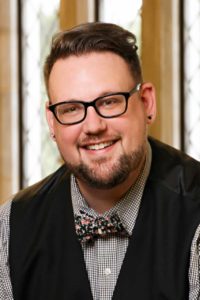For Ted Lewis ’04, the process of embracing being nonbinary began at Mary Washington. Now executive director for a Richmond-based nonprofit, Lewis – who uses they/them pronouns – helps Virginia’s LGBTQ+ youth discover their own fully authentic selves.

This week, Lewis returns to UMW to share personal experiences of coming out and organizing LGBTQ+ youth at universities and communities throughout the South. They’ll speak with students as part of the Gender and Sexual Minorities and Allies Cultural Celebration in the Hurley Convergence Center’s Digital Auditorium today at 7 p.m.
“Being authentic saved my life,” said Lewis, who recalled how powerful it was to connect with LGBTQ+ elders in college. “I’m eager to provide that experience to UMW students.”
Growing up in an interracial household in Vienna, Virginia, Lewis’ activist roots were planted at home. “My family faced our fair share of harassment and microaggressions, so we discussed race, identity and justice around our dinner table. It was always personal.”
A legacy at Mary Washington – mom Carol Williams Lewis is a 1966 alumna – Lewis found a perfect fit. An aspiring educator, Lewis loved the small class sizes and engaging professors, and worked as a short-order cook at Seacobeck and for Residence Life & Housing.
An English and history major, Lewis explored topics like diversity, inclusion, racism and injustice, and devoured Judith Butler’s Gender Trouble and Leslie Feinberg’s Stone Butch Blues, books that shed light on the meaning of being nonbinary – experiencing gender as neither exclusively male nor female. They also found a second home at the James Farmer Multicultural Center.
“It gave me a connection to like-minded students, exposure to amazing speakers and events, and developed my passion for doing social justice work for a living,” said Lewis, who became involved in the Black Student Union and PRISM.
When Lewis expressed doubts about becoming a teacher, a residence life supervisor suggested working in university administration. After graduating, Lewis headed to the University of South Carolina, earned a master’s degree in higher education and student affairs in 2006, and secured two of the first-ever LGBTQ+ leadership positions at UNC Charlotte and University of Richmond.
Lewis spent nearly a decade developing programs and support networks, increasing Safe Zone allies and encouraging inclusive policies on these campuses, particularly for transgender students. They also volunteered for Campus Pride, helping the nationwide organization grow its annual conference and develop closer ties to historically Black colleges and universities.
“I loved higher ed, but it was often isolating and hard,” said Lewis, who, as one of few LGBTQ+ staff members, found it difficult to change policy from within. “It’s easier to push from the outside.”
In 2016, Richmond Organization for Sexual Minority Youth – now Side by Side – was celebrating its 25th anniversary, preparing for an extensive rebranding and seeking new leadership. The timing was perfect for Lewis, who was hired as executive director.
“My first major win came from navigating the organization through that and shifting it toward a larger mission of creating supportive communities where Virginia’s LGBTQ+ youth can define themselves, belong and flourish,” said Lewis, who doubled the operating budget and staff in three years.
With Lewis at the helm, Side by Side is focused on the intersection of race, gender and class. The organization recently launched a Youth of Color group, collaborated with Black Pride RVA, started a program for homeless LGBTQ+ youth and guided Richmond and Stafford schools in developing nondiscriminatory and inclusive policies.
Lewis is heartened to see their community is more “out, proud and visible” than ever before, but concerns remain. Social media has transformed bullying and harassment from “a school-only phenomenon to one that is 24/7/365,” they said. And the Supreme Court continues to hear arguments addressing whether gay and transgender workers can be fired under federal law.
“Not having job security, housing or health care feels like walking on eggshells,” said Lewis, who was once forced to resign from a position for being gay. “It’s the anxiety that comes with knowing that if you are your authentic self, you can be punished and lose everything. These protections won’t magically end discrimination and hatred, but it’s an important first step.”
Today at UMW, they want to inspire hope.
In a Style Weekly article last fall, Lewis shared the words of Pakistani scholar Ayesha Siddiqa: “Be the person you needed when you were younger.”
Now they are.

